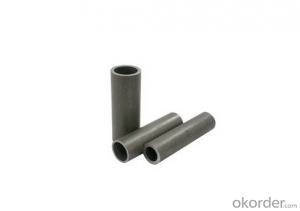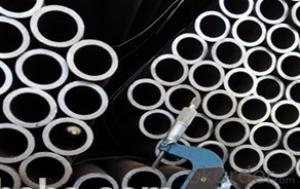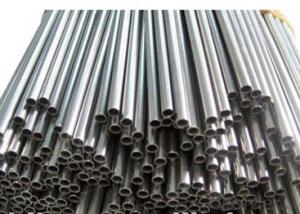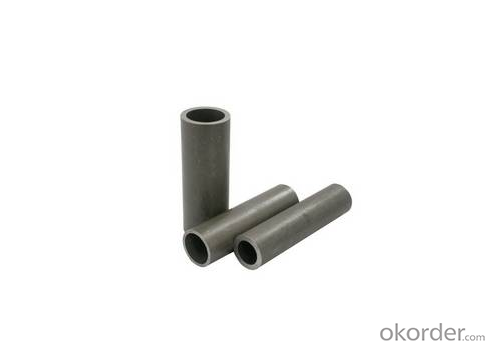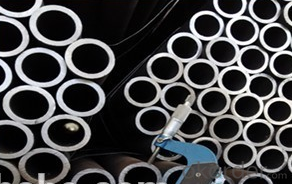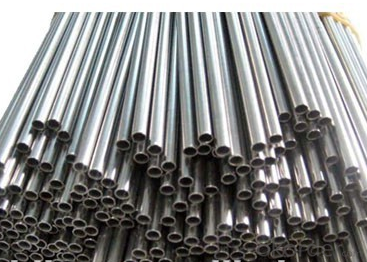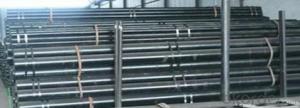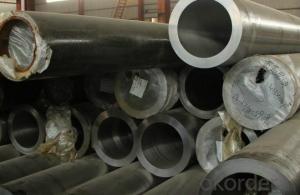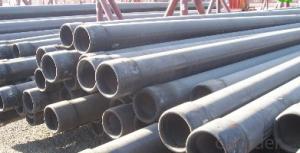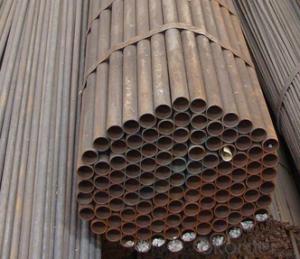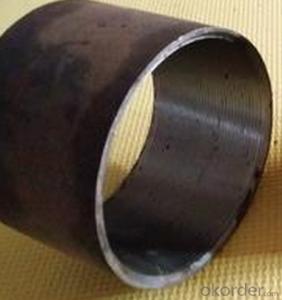1020 Carbon Seamless Steel Pipe A179 CNBM
- Loading Port:
- Qingdao
- Payment Terms:
- TT OR LC
- Min Order Qty:
- 10 pc
- Supply Capability:
- 30 pc/month
OKorder Service Pledge
OKorder Financial Service
You Might Also Like
Quick Details
| Thickness: | 1 - 40 mm | Section Shape: | Round | Outer Diameter: | 21.3 - 609.6 mm |
| Secondary Or Not: | Non-secondary | Application: | Fluid Pipe | ||
| Technique: | Hot Rolled | Certification: | BV | Surface Treatment: | Other |
| Special Pipe: | Thick Wall Pipe | Alloy Or Not: | Non-alloy | Standard: | API 5L,API |
Packaging & Delivery
| Packaging Detail: | Standard seaworthy export packing with steel strip or with plastic clothe, or as requests from the coustomer. |
| Delivery Detail: | 7-25 days after receiveved the deposit |
Specifications
Seamless Steel Pipe
Standard:API ASTM DIN
Size:OD:21.3mm-609.6mm
WT:1mm-40mm
Mechanical properties
standard | grade | Tensile strength(MPA) | yield strength(MPA) |
ASTM A106 | A | ≥330 | ≥205 |
B | ≥415 | ≥240 | |
C | ≥485 | ≥275 |
Chemical ingredients
standard | grade | Chemical ingredients | |||||||||
C | Si | Mn | P | S | Cr | Mo | Cu | Ni | V | ||
ASTM A106 | A | ≤0.25 | ≥0.10 | 0.27~0.93 | ≤0.035 | ≤0.035 | ≤0.40 | ≤0.15 | ≤0.40 | ≤0.40 | ≤0.08 |
B | ≤0.30 | ≥0.10 | 0.29~1.06 | ≤0.035 | ≤0.035 | ≤0.40 | ≤0.15 | ≤0.40 | ≤0.40 | ≤0.08 | |
C | ≤0.35 | ≥0.10 | 0.29~1.06 | ≤0.35 | ≤0.35 | ≤0.40 | ≤0.15 | ≤0.40 | ≤0.40 | ≤0.08 | |
| Company Name | Tianjin Xinlianxin | ||
| Business Type | Manufacturer and Exporter | ||
| Product | steel pipe | ||
| Main Products and Standards | |||
| product name | Specification Range | steel Grade | Executive Standard |
| Structure Pipe | 20mm-820mm 1/2"-32" | 10,20,35,45,16Mn,A53AB | GB/T8162-1999,ASTM A53-98,ASTM500-98,ASTM 500-98,JISG3441-1998,JISG3444-1994 |
| Pipe for Liquid Transportation | 20mm-820mm 1/2"-33" | 10,20,Q345(16Mn),A53AB,A192,SGP | GB/T8163-1999,ASTM A53-98,ASTM A192,JISG3452-1997 |
| Boiler Pipe | 20mm-820mm 1/2"-35" | 20,20G,A179,A106B,A192,ST37.0,ST44.0,ST35.8,ST45.8,Gr320 | GB3087-1999,GB5310-1995,ASTM A106,ASTM A179,ASTM A192,DIN-1629-1984,DIN17175,BS3059.1-1987 |
| 1 | Product | seamless steel pipe | |
| 2 | Standard | U.S.A. | ASTM A53/A106/A178/A179/A192/A210/A213/ A333/A335/A283/A135/A214/A315/A500/A501/A519/A161/A334 API 5L/5CT |
| Japan | JIS G3452/G3454/G3456/G3457/G3458/G3460/3461/3462/3464 | ||
| German | DIN 1626/17175/1629-4/2448/2391/17200 SEW680 | ||
| Britain | BS 1387/1600/1717/1640/3601/3602/3059/1775 | ||
| Russia | GOST 8732/8731/3183 | ||
| China | GB/T8162/T8163 GB5310/6579/9948 | ||
| 3 | Material Grade | U.S.A. | Gr. B/Gr.A/A179/A192/A-1/T11/T12/T22/P1/FP1/T5/4140/4130 |
| Japan | STPG38,STB30,STS38,STB33,STB42,STS49, STBA23,STPA25,STPA23,STBA20 | ||
| German | ST33,ST37,ST35,ST35.8,ST45,ST52,15Mo3, 13CrMo44, 1.0309, 1.0305, 1.0405 | ||
| Britain | Low, Medium, high | ||
| Russia | 10, 20, 35, 45, 20X | ||
| China | 10#, 20#, 16Mn, 20G, 15MoG, 15CrMo, 30CrMo, 42Crmo, 27SiMn, 20CrMo | ||
| 4 | Out Diameter | 21.3mm-609.6mm | |
| 5 | Wall Thickness | 2.31mm-40mm | |
| 6 | Length | As per customers' requirements | |
| 7 | Protection | Plastic caps/ Wooden case | |
| 8 | Surface | Black painting/varnished surface,anti-corrosion oil, galvanized or as per required by customer | |
- Q: How do steel pipes handle ground settlement?
- Steel pipes are generally robust and durable, making them well-suited for handling ground settlement. The flexibility and strength of steel allow the pipes to withstand the shifting and settling of the ground without significant damage. Steel pipes have a high resistance to deformation, which means they can maintain their shape and structural integrity even when the ground settles or moves. When the ground settles, steel pipes can accommodate the movement by flexing and bending slightly. This flexibility allows them to adjust to changes in the ground without breaking or cracking. Additionally, steel pipes are often designed with joints that can absorb and distribute stress caused by ground settlement. Furthermore, steel pipes have a smooth interior surface that minimizes friction and resistance to the flow of materials. This feature is particularly important when the ground settles because it reduces the likelihood of clogs or blockages due to debris or sediment settling in the pipes. In summary, steel pipes are well-equipped to handle ground settlement due to their strength, flexibility, and resistance to deformation. They can adapt to the movement of the ground without compromising their structural integrity, making them a reliable choice for various applications, including underground infrastructure and pipeline systems.
- Q: What is the thermal conductivity of steel pipes?
- The thermal conductivity of steel pipes can vary depending on the specific type of steel and its composition, but generally, steel has a relatively high thermal conductivity compared to other materials. It is typically around 50-60 W/m·K.
- Q: What are the different methods of pipe bending for steel pipes?
- There exists a variety of methods for bending steel pipes, each possessing its own advantages and limitations. 1. Manual Pipe Bending: The bending of steel pipes is achieved through the utilization of hand tools or a manual pipe bender. This method is best suited for small-scale projects or situations where only a few bends are necessary. However, it demands skill and precision to ensure accurate and consistent bends. 2. Rotary Draw Bending: This method involves the utilization of a mandrel, clamp die, and a bending die to bend the pipe around a stationary bend die. The mandrel serves to preserve the shape of the pipe and prevent wrinkling or collapsing during the bending process. Rotary draw bending is commonly employed to produce tight-radius bends with high accuracy and repeatability. 3. Induction Pipe Bending: In this method, a specific area of the steel pipe is heated using an induction coil, rendering it more malleable for bending. Once the desired temperature is attained, hydraulic or mechanical force is applied to bend the pipe. Induction bending is suitable for large-diameter pipes or situations requiring multiple bends in a single pipe. 4. Roll Bending: Also referred to as pyramid rolling, this method involves passing the steel pipe through three adjustable rolls that gradually shape the pipe into the desired form. Roll bending is suitable for generating large-radius bends and is frequently employed in the construction of spiral staircases, handrails, and structural applications. 5. Hot Bending: This method necessitates heating the steel pipe to elevated temperatures, typically accomplished using a furnace, in order to facilitate bending. Hot bending permits greater flexibility in shaping the pipe and is commonly used for large-diameter or thick-walled pipes. However, it demands specialized equipment and expertise to control the temperature and prevent distortion or damage to the pipe. When selecting the appropriate method of pipe bending for steel pipes, it is crucial to take into account factors such as the required bend radius, pipe diameter, wall thickness, and project specifications. Seeking the advice of an experienced pipe bending professional or engineer can assist in determining the most suitable method for a specific application.
- Q: How are steel pipes used in the pulp and paper industry?
- Steel pipes are commonly used in the pulp and paper industry for various applications such as transporting water, steam, chemicals, and other fluids throughout the production process. They are used in the construction of pipelines, conveying raw materials, and transferring finished products. Steel pipes provide durability, reliability, and resistance to corrosion, making them suitable for handling the harsh conditions and corrosive substances found in the industry.
- Q: What are the common materials used for pipe fittings in steel pipes?
- The common materials used for pipe fittings in steel pipes include carbon steel, stainless steel, and alloy steel. Carbon steel pipe fittings are widely used due to their affordability, strength, and durability. They are suitable for various applications, including oil and gas, petrochemical, and water distribution systems. Stainless steel pipe fittings are highly resistant to corrosion and are commonly used in industries that require a high level of hygiene, such as food and beverage and pharmaceutical industries. Alloy steel pipe fittings are composed of multiple elements, such as chromium, nickel, and molybdenum, to enhance their strength and resistance to corrosion. These fittings are often used in high-pressure and high-temperature applications, such as power plants and chemical plants. Overall, the choice of material for pipe fittings in steel pipes depends on the specific requirements of the application and the environment in which they will be used.
- Q: Are steel pipes suitable for underground sewage lines?
- Yes, steel pipes are suitable for underground sewage lines. They are strong, durable, and resistant to corrosion, making them an excellent choice for sewage systems.
- Q: How are steel tubes represented?
- If it is seamless steel pipe, welded steel pipe, the method of expression is: nominal diameter refers to the outer diameter (diameter * wall thickness). The unit is mm. [for example, seamless steel tubes of phi 32 * 3. It means that the nominal diameter (outside diameter) is seamless steel pipe of phi 32mm and wall thickness 3mm.
- Q: What are steel pipes made of?
- Steel pipes are made of a strong and durable alloy known as steel, which is primarily composed of iron and carbon, along with small amounts of other elements such as manganese, silicon, and sulfur.
- Q: What are the different types of coatings used for internal lining of steel pipes?
- There are several types of coatings commonly used for the internal lining of steel pipes, including epoxy coatings, polyurethane coatings, cement mortar linings, and polyethylene linings. Each type of coating offers different benefits and is chosen based on factors such as the intended application, corrosion resistance requirements, and cost-effectiveness.
- Q: Are steel pipes suitable for transporting chemicals?
- Yes, steel pipes are suitable for transporting chemicals. They are known for their durability, corrosion resistance, and high strength, which makes them ideal for carrying various chemicals safely and efficiently. Additionally, steel pipes can withstand high pressure and extreme temperatures, making them a reliable choice for transporting chemicals in industries such as oil and gas, petrochemicals, and manufacturing.
Send your message to us
1020 Carbon Seamless Steel Pipe A179 CNBM
- Loading Port:
- Qingdao
- Payment Terms:
- TT OR LC
- Min Order Qty:
- 10 pc
- Supply Capability:
- 30 pc/month
OKorder Service Pledge
OKorder Financial Service
Similar products
Hot products
Hot Searches
Related keywords
